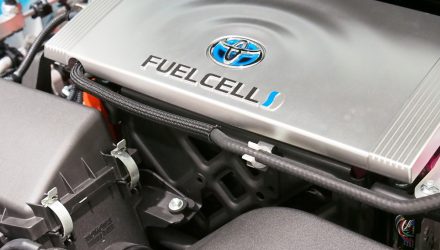The automotive industry is beginning its massive pivot to low and no-emissions vehicles and while electric options continue to spring up every few months, Toyota is looking to expand even further into hydrogen.
Toyota Motor Europe has signed an agreement alongside CaetanoBus and Air Liquide to create and manufacture hydrogen transportation options in Europe, beginning with cars, buses, light commercial vehicles, and expanding into heavy-duty trucks, reported CNBC. The three companies have agreed to tackle the necessary infrastructure for hydrogen fueling and distribution, the production of low-carbon and renewable hydrogen, and its inclusion in vehicles.
Toyota is no stranger to hydrogen use, having launched a hydrogen fuel cell sedan in 2014. A hydrogen fuel cell creates electricity by mixing hydrogen and oxygen and emits only water vapor according to Toyota. The company is also looking into utilizing hydrogen in internal combustion engine vehicles.
The use of hydrogen as an alternative to fossil fuels remains a divisive one within the automotive industry, with companies like Toyota, BMW, and Hyundai all researching hydrogen options. Meanwhile, Tesla and Volkswagen remain critics. It’s important to note that the latter two both produce battery electric vehicles, a direct competitor to hydrogen offerings.
Investing in the Transportation Industry’s Net-Zero Transition
The IQ Cleaner Transport ETF (CLNR) provides an investment opportunity within the transition of the transportation sector and companies focusing on renewables. CLNR also donates portions of proceeds to the National Wildlife Foundation to help fund its mission to save ecosystems and wildlife for the betterment of all.
CLNR seeks to provide investors with exposure to companies globally that are focused on clean energy resources, transportation equipment and services, technology that makes transportation more efficient, and infrastructure components.
The fund is dual impact in that it has aligned with the National Wildlife Federation and donates a portion of CLNR’s management fees to the organization. CLNR focuses on the transportation industry, which makes up around 20% of emissions annually, and seeks to support the human interventions happening within the climate change arena to help reduce greenhouse gas emissions derived from fossil fuel use.
CLNR seeks to track the IQ Candriam Cleaner Transport Index, which uses thematic selection to include companies involved in or related to activities that protect or achieve cleaner transportation technologies. This includes electric vehicles, bicycles, vehicle manufacturers, multi-passenger vehicles, renewable energy productions in vehicles, sustainable mining for battery resources, and sustainable transportation infrastructure.
The fund invests across all caps globally, screens out companies that do not meet ESG criteria, and uses an exclusionary screen. Companies are assigned a score based on their revenue, materiality, and impact. The top 50–80 scoring companies are included in the index. The index is weighted using a modified market cap-weighting methodology with companies weighted at a minimum of 0.25% and a maximum of 3%.
CLNR carries an expense ratio of 0.45% and Toyota is carried at a 2.9% weighting within the equal weighted fund.
For more news, information, and strategy, visit the Dual Impact Channel.
